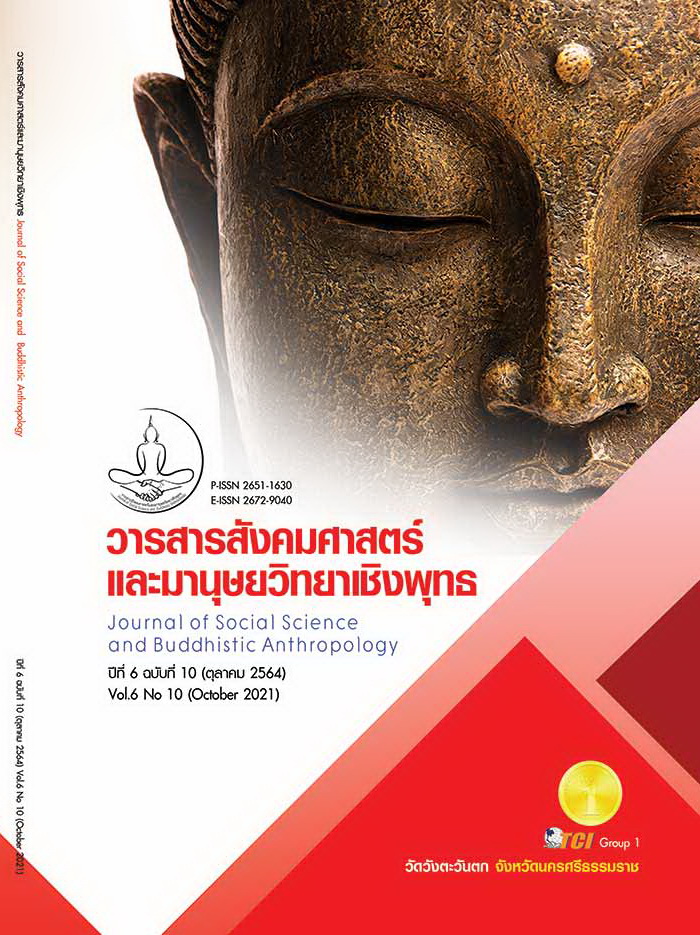LIFE NEW NORMAL TO THE SUFFICIENCY ECONOMY PHILOSOPHY OF SURATTHANI MUNICIPALITY COMMUNITY
Keywords:
Living, New Normal Life, Sufficiency EconomyAbstract
The objectives of this research article were 1) to study about the New Normal Life based on the Philosophy of Sufficiency Economy; 2) to study about the casual relationship in terms of the impacts of the COVID - 19 crisis, the attitude towards the principle of the Philosophy of Sufficiency Economy, the knowledge about the Philosophy of Sufficiency Economy and the living based on the Philosophy of Sufficiency Economy; and 3.) to analyze the New Normal way of life based on the Philosophy of Sufficiency Economy of residents in Suratthani Municipality Community. This was the quantitative research. The sample was residents in Suratthani Municipality Community. Hierarchical Linear Modeling was used to analyze the sample size for data collected within the group of residents. Questionnaires and quizzes were used as research tools. The confidence value was derived 0.92 from questionnaires and 0.60 from quizzes. The data were statistically analyzed by using Frequency, Percentage, Mean, Standard Deviation and Statistical Inference. Inferential statistics is to analyze the casual influences by using affirmative element analyzes in order to verify the indicators of variable components in the model measurement. The research findings were emerged respectively. Firstly, 1) the scenario of the New Normal way of life based on the Philosophy of Sufficiency Economy was practiced at a moderate level according to be considered for each aspect as follows: the aspect of the living based on the Philosophy of Sufficiency Economy; the aspect of the knowledge about the Philosophy of Sufficiency Economy; and the aspect of the impacts of the COVID-19 crisis, respectively. Secondly, 2) the casual relationship among the impacts of the COVID - 19 crisis that were considered as follows: 2.1) the aspect of the attitude towards the principle of the Philosophy of Sufficiency Economy was referred to the factors associated with economic, occupation, self-reliance and middle path (moderate practice); 2.2) the aspect of the knowledge about the Philosophy of Sufficiency Economy relied on the self-adaptation into the Philosophy of Sufficiency Economy; and 2.3) the aspect of the living based on the Philosophy of Sufficiency Economy was considered in the moderate practice and the standard of moral. Lastly, 3) the New Normal way of life consisted of expenses, health care, coexistence, moderate practice and new normal working.
References
กมลรัตน์ ทองสว่าง. (2560). การประยุกต์ใช้ปรัชญาเศรษฐกิจพอเพียงในชีวิตประจำวันของประชาชนในเขตอำเภอเมืองชัยภูมิ จังหวัดชัยภูมิ. ใน รายงานวิจัย. มหาวิทยาลัยราชภัฏชัยภูมิ.
กรมควบคุมโรค. (2564). สถานการณ์โควิด-19 ในประเทศไทย. เรียกใช้เมื่อ 15 กุมภาพันธ์ 2564 จาก https://ddc.moph.go.th/
จรูญ รัตนกาล. (2556). การประยุกต์หลักพุทธธรรมและแนวคิดเศรษฐกิจพอเพียงเพื่อการอยู่ร่วมกันของประชาชนในพื้นที่ตำบลสามบัณฑิต อำเภออุทัย จังหวัดพระนครศรีอยุธยา. ใน รายงานวิจัย. มหาวิทยาลัยราชภัฎพระนครศรีอยุธยา.
ฉัตรศิริ ปิยะพิมลสิทธิ์. (2556). การวิเคราะห์เส้นทาง (Path Analysis). ศูนย์การเรียนรู้ทางการวิจัย. เรียกใช้เมื่อ 6 มกราคม 2564 จาก http:// rlc.nrct.go.th/ewt_dl.php?nid=1106.
ดาณุภา ไชยพรธรรม. (2550). เศรษฐกิจพอเพียง: ชีวิตต้องรู้จักพอก่อนที่จะไม่มีอะไรเหลือให้พอ. กรุงเทพมหานคร: สำนักพิมพ์มายิก.
นภชา สิงห์วีรธรรม และคณะ. (2563). การรับรู้และพฤติกรรมการป้องกันโรคติดเชื้อไวรัสโคโรนา 2019 (COVID-19) ของทันตาภิบาล สังกัดกระทรวงสาธารณสุข. วารสารสถาบันบำราศนราดูร, 14(2), 104-115.
ปรียานุช พิบูลสราวุธ. (2551). คลังหลวงกับหลักปรัชญาของเศรษฐกิจพอเพียงโครงการวิจัยเศรษฐกิจพอเพียง. กรุงเทพมหานคร: โครงการวิจัยเศรษฐกิจพอเพียง.
ผ่องศรี พัฒนมณี. (2559). การประยุกต์ใช้หลักปรัชญาเศรษฐกิจพอเพียงในชีวิตประจำวันของประชาชนหมู่ 3 ตำบลไม้ฝาด อำเภอสิเกา จังหวัดตรัง. ใน รายงานวิจัย. มหาวิทยาลัยราชมงคลศรีวิชัย.
สุเมธ ตันติเวชกุล. (2554). การทรงงานพัฒนาประเทศของพระบาทสมเด็จพระเจ้าอยู่หัว. กรุงเทพมหานคร: สำนักงานคณะกรรมการพัฒนาการเศรษฐกิจและสังคมแห่งชาติ.
เสาวณีย์ อาภามงคล. (2558). ตัวแบบการพัฒนาชุมชนด้วยแนวคิดเศรษฐกิจพอเพียง. ใน ดุษฎีนิพนธ์ปรัชญาดุษฎีบัณฑิต สาขาวิชาการเมือง. มหาวิทยาลัยรามคำแหง.
อภิชิต ดวงธิสาร. (2560). การจัดการเพื่อสร้างชุมชนเข้มแข็งภายใต้ปรัชญาเศรษฐกิจพอเพียง : กรณีสถาบัน การเรียนรู้เพื่อปวงชน จังหวัดชัยภูมิ. วารสาร มจร สังคมศาสตร์ปริทรรศน์, 6 (2), 347-358.
Rothan H. A, & Byrareddy, S. N. (2020). The epidemiology and pathogenesis of coronavirus disease (COVID-19) outbreak. Retrieved May 21, 2021, from https://ddc.moph.go.th/102433.doi:10.1016/j.jaut.2020.102433









